R. Harrison's Blog, page 28
March 17, 2016
The Uses of Poetry
William Carlos Williams, 1883 – 1963
I’ve fond anticipation of a day
O’erfilled with pure diversion presently,
For I must read a lady poesy
The while we glide by many a leafy bay,
Hid deep in rushes, where at random play
The glossy black winged May-flies, or whence flee
Hush-throated nestlings in alarm,
Whom we have idly frighted with our boat’s long sway.
For, lest o’ersaddened by such woes as spring
To rural peace from our meek onward trend,
What else more fit? We’ll draw the latch-string
And close the door of sense; then satiate wend,
On poesy’s transforming giant wing,
To worlds afar whose fruits all anguish mend.


March 16, 2016
On Romance…
or the structure of a romantic story and why it matters.
The basic form of a romance story is surprisingly simple. Boy being meets girl being, or more often girl being meets boy being, and after some complications they wander off under the light of the setting moon with a happy ever after ending. Or at least happy ever after, for now. With such a simple plot, one descended almost intact from Homer (the wily Odysseus overcomes many obstacles to be reunited with his faithful dog Argos. Oh and his wife Penelope), romance seems a trivially easy thing to write.
Romance may be trivial to write, but it’s not trivial to write well.
View original post 660 more words


Oliver the spy.
I pride myself on being reasonably accurate in my historical fiction. I say reasonably, because I do make mistakes, but never intentionally. It’s quite hard, indeed impossible, to get it right – the way it really was. Simply because there was no ‘the way it was’ and everyone’s experience was their own. The documentation is also contradictory and has to be used with caution.
As an aside, many things that people think are ‘mistakes’ are actually correct – Sir William Knighton, Doctor to the King and the Ton, almost certainly had what could best be described as a poor understanding of disease, physiology and health. So you probably would be better off with a boy scout who has just passed 1st class first aid than the ‘best’ doctor of the age. And, yes, you could get from Bath to London in a day in 1810 – though you did stop to change horses at every stage (roughly every hour).
Those snide comments aside, how do you get it right?
The answer is research.
I’ve been writing a work, set in 1816, later than most of my recent work. Napoleon has been vanquished completely, banished to St. Helena and all is right in the world. Well, no. England, without the stimulus spending of the war, and in the throes of the first industrial revolution, is in dire straits. The government structure is mired in a mixture of medieval and Georgian incompetence. In other words, time was ripe for a revolution.
It really was ripe for reform, where radical ideas like one-man one vote were past due. (Even one propertied man one vote, saying nothing about one-woman one vote).
Unfortunately the government did not like this idea. Not one little tiny bit. And so they came up with an idea that was worthy of a conspiracy theory that would make the speculation about JFK’s assassination or our president’s birth certificate look like pikers. They would use agents to start rebellions, crush the rebellions with military force (had to do something with those soldiers, you know) and use that as an excuse to enact Draconian legislation.
Enter William J Richards or William Oliver. Better known as Oliver the spy. After being released from debtor’s prison, he spent the spring of 1817 travelling around the midlands, setting a pace that would be hard to do with an automobile today, and hitting every reform meeting he could. (When he didn’t stop at Sir John Byng’s regiment to arrange for backup and keep the authorities informed.) Eventually he struck gold, and fomented the Pentridge (Pentrich) rebellion. Oliver was a bit lucky here, had the leader of the Pentridge rebellion been in Nottingham the week before, he would have known Oliver was a spy. It, of course, was crushed – by the 15th Hussars (of Peterloo fame) – and the ring leaders duly hung or transported.
It and related events allowed Parliament to pass the ‘six acts’ in 1819. Laws that restricted assembly, freedom of speech and other things we take for granted. Even when the laws were vaguely sensible, they had nasty features such as eliminating the need for a search warrant.
The preamble, quoted below, says it all.
every meeting for radical reform is an overt act of treasonable conspiracy against the King and his government
Thrilling times.
The featured image shows his signed deposition.


March 14, 2016
The Art of Deception #amwriting #mondayblogs
This is a chapter from a book I’m writing. I’ve been presenting sections on Weekend Writing Warriors and I’d like to present the whole chapter as it is difficult to get the flavor in ten-line segments. This is the second chapter in the book, and I can make an ARC available.
Washington
Roderick, Lord Fitzpatrick stretched his legs and tried to make his hard chair somewhat more comfortable. He and Anthony Merry, the new British Minister to the United States were deep in conversation in Mr Merry’s chambers at the British consulate. The consulate was, like most of the rest of the new capitol city, a hastily erected, draughty and uncomfortable structure. While nominally Mr Merry’s social superior, he was from a different branch of the diplomatic corps, one that was less concerned with the social and diplomatic niceties. When it came to normal, above board, diplomacy Mr Merry was by far the more experienced of the two. Mr Merry looked exactly like what he was, the middle-aged son of a wealthy wine merchant, while Roderick displayed his natural athletic build and dark good looks. Despite their apparent difference, the two men were close friends, united against their common adversary.
“I say, Roddy, how did ever you stick it here? All that time you spent here after Sir Robert returned home. It must have been dashed difficult for you. The Jonathan’s.” He shook his head, “Their manners leave much to be desired.”
“What do you mean by that?”
“That Jefferson fellow, didn’t you find him rude? I mean he called my wife a ‘virago’, and Elizabeth, whatever her failings is not that.”
“She’s a lovely woman, well-mannered and gracious. If you want to meet a virago, you need only talk to the Dowager Fitzpatrick.”
“So that’s why you haven’t married? Still, can you imagine inviting us and the French charge de affairs to the same private dinner? We’re at war. It’s just not done.”
Roderick shrugged, “I just ignore the slights. Treat their politics like a spectator sport. It’s almost as much fun as ratting or the cockpit. As for marriage, you know I find these provincials even more tedious than the butterflies and damsels of the London Ton.”
“De gustibus and all that I suppose.”
“Precisely. I have yet to meet a female who doesn’t pale upon further acquaintance, Mrs Merry excepted. Besides, in my line of work, a female attachment could be fatal. Both for her and for me.”
“Ah, I suppose you’re right. Anything you should tell me?”
“From my line of work?”
Anthony nodded, “Any traps for the unwary. I don’t want to know about the rest. Always best to just put it in the diplomatic pouch and be done with it. Can’t lie about what I don’t know.”
“I’d watch that Colonel Burr. Don’t think I’d trust him.”
“It would be good if we could get our hooks into Louisiana. Let the Brother Jonathan’s purchase it from that Corsican and then steal it from them.”
“Great if it works, but I my sources say the Colonel is not reliable. Indeed, dangerously unreliable. Like most of the colonials, more hot air and bluster than substance. You could easily end up adrift at point non plus in deep water.”
A footman knocked on the door and interrupted their discussions. “Sir, an emissary from President Jefferson.”
“Not another invitation to a dreadful dinner?”
“He did not say, Sir. It is Captain Lewis.”
“Ah, then it is serious.” Captain Lewis was a presidential aide, a close confidant of Mr Jefferson. He would not visit an embassy on a mere social call or for something as trivial as an invitation to a state dinner. “Show him in.”
The footman returned with Captain Lewis. He, Captain Lewis that is, carried a jemmy . “I believe this is yours.”
“No,” Lord Fitzpatrick replied, “never seen it before. What is it?”
“A jemmy or crowbar. Are you certain you’ve never seen it?”
“I am a gentleman.”
“That is debatable. However, this jemmy is made in Sheffield, of finest English spring steel. Stamped by its makers.”
“I see. Where did you find it?”
“I didn’t, Mr Jefferson did. In his office.”
“Ah.”
“We can’t understand what it was doing there. You say you are certain it’s not yours.”
“Absolutely.”
“I’m sorry to say we don’t believe you.” Captain Lewis handed Mr Merry a letter. “Lord Fitzpatrick is now a persona non gratia in the United States.” He bowed and turned to leave. “And since this isn’t yours, I’ll keep it. As a souvenir of our acquaintance.”
“As you wish. It’s not mine. I hope it brings you luck. Looks dashed useful, what is it for?”
“You will, of course, be communicating your travel plans.”
“Overland to New York, Packet to Portsmouth or Bristol.”
Captain Lewis nodded. “Sorry to see you leave, but -”
“It’s best.”
After Captain Lewis left, Anthony said to Roderick, “That wasn’t yours was it?”
“No, I don’t do anything as crude as housebreaking. I will need your aid to clean up a few loose ends when I go. My manservant, Thomas.”
“I wish you wouldn’t keep slaves. I won’t sell him for you.”
“He’s not a slave. His wife, Hannah -”
“She is?”
Roderick nodded, “Unfortunately, yes. She’s a maid and housekeeper … in the President’s house. Could you arrange to purchase her? Her freedom was her price, and I should like to think His Majesty’s government lives up to its promises. I told you I don’t use crude methods, and she’s been most helpful to the crown.”
“I wouldn’t know how. Unseemly for the minister to appear at an auction.”
“I’ll drop a hint in Captain Lewis’ ear that you need a new maid when I give him my detailed itinerary tomorrow. He’ll jump at the chance to put a ‘loyal servant’ of his own inside our embassy. Then I think Boston or Canada would be best for them. Much healthier climate, especially if you are of a swarthy hue.”
“I see. You know that I can’t put those expenses on the diplomatic account.”
Roderick passed him an open draft on his bank. “Take what you need. Give them what’s left.”
****
That evening, as he was preparing for bed, Roderick noticed something was bothering his servant. “Thomas, what is wrong?”
“Nothing, sir.”
“You’re not upset that I’m bound for England? I could bring you, but I’ve arranged with the minister to see that Hannah is freed. There should be a decent nest-egg left over for the two of you. I suggest going North, Canada if you don’t mind the cold.”
Thomas grew even quieter, more distant.
“It’s Hannah, isn’t it? What’s happened?”
“Sold.”
“Sold?”
“They’re sending her South.”
“Bugger it! Where, when?”
“Today, she’s in Robey’s warehouse, chained. Auction tomorrow.”
“Robey’s tavern?”
“Either that or the Yellow House next door.”
Roderick paused, while he claimed crude methods were beneath him, there were times, and this was one of them, that they were appropriate. “Thomas, I think a change of garment is in order. Lay out the gentleman’s ken cracking clothes. I’ll need my screws, the phos bottle and … whatever happened to my jemmy, by the way?”
“I was visiting Hannah.”
“Thought as much. That was a tad sloppy of you. If you’d see that our mounts are ready, and I’ll need a light travelling bag packed. Can Hannah ride?”
“She’ll ride with me.”
“Good enough. Avaunt mon ami!”
****
The British Minister was summoned to the President’s House the next morning. Captain Lewis met him. He was not pleased.
“Where is Lord Fitzpatrick?”
“Lord Fitzpatrick, may I enquire why you wish to see him?”
“Someone burned down the slave pens at the Yellow House. Thousands of dollars of property has gone missing, vanished into the night.”
“It has? What possibly could this have to do with him?”
“One of the chattel who disappeared was the wife of his servant. Mr Jefferson wanted her out of the President’s House. We also found the remains of a phosphorus jar. It was used to start the fire.”
“Indeed. I still fail to see how that is relevant.” Mr Merry was a master of obtuseness. It stood him in good stead, especially in times like these.
“Isn’t it obvious?”
Mr Merry stared at him, and completely missed his point. Again he said deliberately, as he was being annoyingly obtuse and enjoying it. “That reminds me, we’re looking for a housekeeper. You wouldn’t know of one who is available?”
“No. Do you know where that man is? I have a few questions for him.”
“Not exactly, but he did leave a note. Apparently, he discovered that if he left last night there was a good chance of catching this month’s packet home. I gather he was in a hurry to sup at Whites. Not sure I blame him. Dreadful food here, simply dreadful.”
“So he’s on his way overland to New York. Wouldn’t the coastal schooner be faster?”
“That’s what he said, and I have no reason to doubt him. I gather he is prone to seasick and in any case the ocean voyage will be enough time on a ship for anyone. His manservant is riding with him. I’m to send his luggage along on a coastal schooner – under diplomatic seal.”
There are some very good reasons why Thomas cannot go himself to free his wife. He’d be shot or chained. On the other hand, Roderick would be inconspicuous, simply another potential bidder inspecting the wares.


March 13, 2016
Shortbread, done right this time. #easyrecipe #cookies
A while ago I tested a historical recipe for shortbread. It wasn’t exactly a success. Time to fix that. This is a fairly traditional English recipe that works well with American ingredients.
Take 1/4 pound (1 stick) butter and 4 tablespoons of sugar. You could use margarine, but butter really is best for this.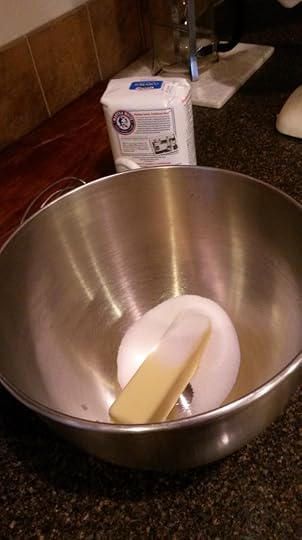
Cream them, and then add 1 cup of flour. (Plain flour, not self-rising, about 1/4 pound or 55g) Mix until it is all combined. It should resemble:

Press into a pan, about 1/2 inch or 1cm thick. You can prick this with a fork, but it isn’t necessary. Bake it for 1 hour in a cool oven (300F or 150C). The edges should just be turning brown.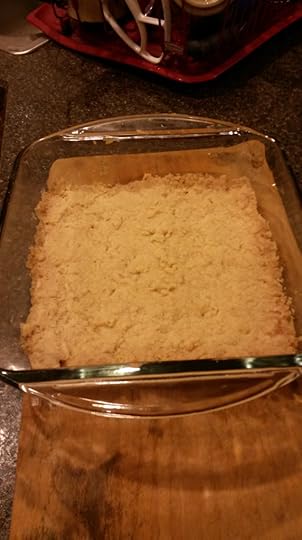
Cut into shapes while hot (it will be very soft). Let cool and remove from the pan.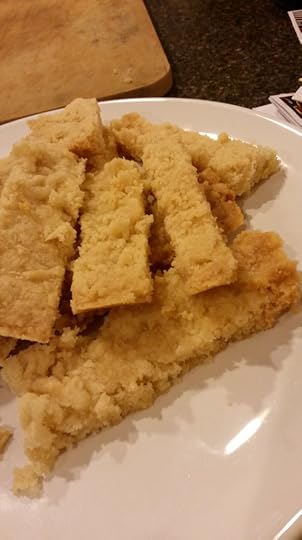
Enjoy.


March 12, 2016
The Art of Deception 5 #wewriwar #amwriting
or Pride and Extreme Prejudice

Welcome to Weekend Writing Warriors. This week I continue another book, that will eventually come out via booktrope. It’s a spy story set in late Georgian England, the year before Trafalgar. Last week Captain Meriwether Lewis makes a brief appearance when he explains to Mr Merry and Lord Fitzpatrick (Roderick), why he is no longer welcome in the US. This week I answer several questions about Sir Roderick before returning to Alice’s story.
After Captain Lewis left, Anthony said to Roderick, “That wasn’t yours was it?”
“No, I don’t do anything as crude as housebreaking; I will need your aid to clean up a few loose ends when I go – my manservant, Thomas.”
“I wish you wouldn’t keep slaves; I won’t sell him for you.”
“He’s not a slave … his wife, Hannah -”
“She is?”
Roderick nodded, “Unfortunately, yes; she’s a maid and housekeeper … in the President’s house; could you arrange to purchase her? Her freedom was her price, and I should like to think His Majesty’s government lives up to its promises; I told you I don’t use crude methods, and she’s been most helpful to the crown.”
“I wouldn’t know how; unseemly for the minister to appear at an auction.”
“I’ll drop a hint in Captain Lewis’ ear that you need a new maid when I give him my detailed itinerary tomorrow; he’ll jump at the chance to put in a ‘loyal servant’ of his own inside our embassy. Then I think Boston or Canada would be best for them; much healthier climate, especially if you are of a swarthy hue”
Please see the other talented writers in Weekend Writing Warriors.
One of the Union’s most successful spies during the American civil war, Mary Bowser, was Jefferson Davis’s black (slave) housekeeper. Belle Boyd and her ilk were rank amateurs by comparison. The X on the featured image shows where Robey’s Slave pen was located.
I’ve also released a sweet regency romance, Miss DeVere This is a fun read, and unlike “The curious profession of dr craven” seems to not carry a curse.
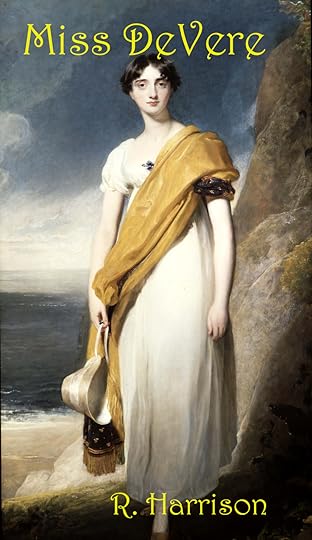
Frankenkitty is available.
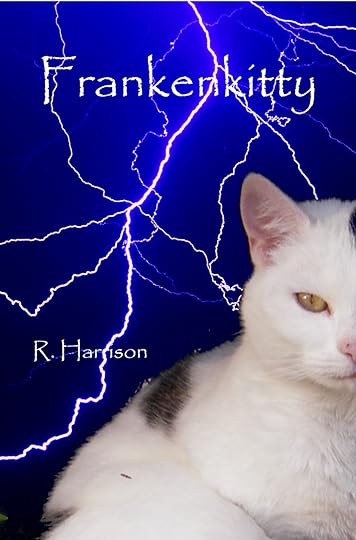 What happens when teenagers get to play with Dr Frankenstien’s lab notebooks, a few odd chemicals and a great big whopping coil? Mayhem, and possibly an invitation to the Transylvanian Neuroscience Summer School.
What happens when teenagers get to play with Dr Frankenstien’s lab notebooks, a few odd chemicals and a great big whopping coil? Mayhem, and possibly an invitation to the Transylvanian Neuroscience Summer School.
Get Free Stuff and try out my landing page. There are three free complete short stories (including an ARC for Frankenkitty) available after you’ve gone through the hoops.


Amazon Takes Aim At Scammers But Hits Authors
publishing is already hard enough
 Amazon is an extremely innovative company – and usually quite responsive to self-publisher’s concerns – but sometimes it gets things very wrong too.
Amazon is an extremely innovative company – and usually quite responsive to self-publisher’s concerns – but sometimes it gets things very wrong too.
Today is one of those times.
I’ve received several reports from writers threatened with having books removed from sale, and heard even more worrying stories from others who had their titles actually removed from the Kindle Store without notice.
What were these authors guilty of? What crime did they commit for Amazon to adopt such heavy handed treatment? Something completely innocuous: the Table of Contents was at the rear of their books instead of at the front.
Yep, that’s it.
We’ll get to what might be the root cause of this crackdown in a moment, but Amazon is claiming that having a TOC in the end-matter instead of the front-matter is a breach of the (ever-changing, 100+ pages) Kindle Publishing Guidelines (PDF). Amazon says that rear TOCs result in…
View original post 2,654 more words


March 11, 2016
A Formulaic Romance #amwriting #Fridayreads #wip
I often put the beginnings of books on my blog. They don’t always make it to the end, but I find it helpful. This is another Regency Romance. This time without grave robbing.
I’d love to hear what you think. The title is an allusion to the hero’s interests. There’s another one in the story, but you’ll have to know your chemical history to get it.
An Interruption.
“That’s bloody torn it!” Miss Rachel Heppleworth, the youngest and only surviving daughter of Lord Hayforth, was rarely moved to rough language, but her ancient carriage finally failed on her way to London. On her one chance to join society and find a suitable, rich, and hopefully reasonably good looking or at least good mannered, husband. Preferably, not vicious, a non-smoker, though she approved of snuff, at most a moderate gambler, and willing to squire her to the occasional assembly. It would be an extra bonus if he were discreet in his affairs and sensible in his conversation. She and her maid stood while the rain soaked through their pelisses and trickled down their backs. They surveyed the wreck of their carriage. One postilion had ridden ahead to find help.
Lucinda, her maid, companion, and confidant replied, “Miss?”
“It’s raining, almost snowing, the thoroughbrace broke and the weight of the carriage body snapped the rear axle. We’re stuck, here in the middle of nowhere, and worst of all we were due in London by the end of the week.”
“Miss we can always send a letter. Lord Bromly would understand.”
“If the post runs out here.”
Lucinda shivered, the cold and damp had already penetrated her pelisse. Miss Rachel did not fail to notice the chill, nor did she ignore her maid and companion’s discomfort. She pointed to a massive pile of bricks and spires in the distance. “We could see if there is anyone living in that pile of stones. There seems to be a fire and lights.”
Lucinda followed her mistress’s gesture, and gasped, “It’s a mile off, at least. Down a muddy lane.”
“We’ll warm up on the way. You’re already blue from the cold, and there’s nowhere else we could go. I’ll leave a note in the carriage.”
A few minutes later, they started down the mucky lane. It wasn’t heavily travelled, which was a benefit. The mud was just mud and not that mixture of mud and manure the polite world referred to as slough. Still, it was slippery and stuck to the hems of their gowns. Their steps squelched in the mire. Rachel slipped and fell. When she arose, she was covered in the brown gooey slime. She smiled at Lucinda and said, “I hope they’ll send for our trunks.”
“I hope they’ll let you have hot water.”
Shortly after that, Rachel and her maid stood in front of the front door. The building was larger than it had looked from a distance. It was an ancient building that some recent owner had tried to refit into the Georgian style, with mixed success. It was a far more impressive building now that they were finally standing in front of it than it had appeared from the main road.
Rachel quailed at the thought of knocking on the door. Then she steeled herself and said, “Ready?”
Lucinda nodded, and Rachel pulled the bell. A dull ring echoed from the depths of the hall. It finished echoing and there was no response. Rachel pulled on it again. This time the door opened almost immediately. What had been a dull ring became unpleasantly loud.
A tall, gaunt man answered the door. He examined them, from head to foot, and then from foot to head, taking in the details of their dress and its apparent cleanliness. Finally having decided that they were less than genteel, he said, “Yes, Miss? We do not make donations or give alms from this house. The servants entrance is around back if you are desirous of employment. Though we do not need a scullery maid at present.”
“I am Rachel, Lady Hayforth and this is my companion, Miss Holloway. My, our carriage broke on the main road and we wondered if there were some shelter from this inclement weather. Common manners would suggest that we should be welcome.”
The man slowly nodded, and then said, “I see, Ma’am. If you will accompany me, I shall see what the master says.”
He opened the door and lead the two women into the dark hall, and then into a side parlour. One lined with books, books that appeared to have been used. A plethora, a veritable ark of stuffed animals decorated the room. This only added to its melancholy. After saying, “Please wait here,” he turned and slowly made his way off into the dim recesses of the building.
Lucinda turned to her mistress and said, “This is just like a Gothic romance. I’d not be surprised to find a skeleton behind that curtain.” Behind her water streaked down the windows. The storm had decided that rain was in order and now the heavens had opened. The darkening skies made the room grow ever more dim and full of shadows. Lucinda shook from the cold, her teeth chattering as her body tried to warm itself.
“Nonsense Lucinda. This is England, 1816 and not some strange foreign land.” Rachel strode to the curtain, looked at her maid, and pulled the curtain aside. “What did I tell you?”
Lucinda gasped, and Rachel looked. There was a skeleton, a human skeleton mounted as an anatomical display. She quickly pulled the curtain closed with a snap.
“I just hope they are open to visitors and not in deep mourning. I’m so famished that I’d gnaw on these bones.”
“I hope they have a good laundress. Your gown, Miss.”
“Not to mention my face. At least we’re out of the rain and the cold.”
****
Rupert was deeply into his latest experiment, electrolysing a molten salt to see what metal he could recover, when he was interrupted by a knock on the laboratory door. The windows in the laboratory were open to disperse the thick yellow gas that rose from one electrode, and a cold wind blew through the room. The thick coat he wore, because of the cold, concealed a wiry yet muscular frame. His dark hair was partially bleached from the caustic fumes which gave him unusual blonde streaks. The fumes had also bleached his face, giving him a ghastly white pallor. He wore goggles to protect his eyes. Without looking away from his apparatus, he said, “Edward, what is it, now?”
“Sir, there are two women at the front door. They asked for refuge from the storm, their carriage having had and accident on the main road.”
“You know my opinion about visitors. Send them away.”
“One of them is uncommonly pretty, sir. She would be a diversion.”
“I don’t want to be diverted, but,” he paused, “Are they suitable company?”
“One claims to be Lady Hayforth, the other her maid. They are young.”
“Suggesting something again, Edward?”
“I wouldn’t take that liberty, Sir. Still, may I remind you about the entail?”
“Yes, I know, I shall marry, sometime, if I ever meet the right woman.” Rupert shrugged, “Which seems rather unlikely. My experiment is at a critical stage. See that they are warm and send someone for their bags. I’ll be ready at the regular time for supper.”
“Sir.” Edward bowed. Then he shuffled off.
****
A few minutes afterwards, with Mrs Hobbes, the housekeeper behind him, he shuffled into the hall.
“Lady Hayforth,” he wheezed, “the Master says that we are to see to your comfort. Mrs Hobbes will escort you.”
Mrs Hobbes curtsied to Rachel, “Lady Hayforth. If you would follow me. We shall see to that gown.”
Lucinda asked, “Our baggage?”
“We’ll send a cart.” Mrs Hobbes smiled, “Don’t worry, the Master is friendly enough. At least when he’s not cooking something up in his laboratory. Follow me.”
She led them upstairs, “Lady Hayforth, this is your room. I’ll see that warm water is sent up.”
Not many minutes later, with her face, arms, and hands, cleaned and her gown drying by the fire, Rachel smiled at her maid from a warm bundle of blankets. “I think we’ve landed on our feet.”
“I don’t know Miss Rachel. This ‘Master’ seems to command almost oriental obedience from his servants.”
“And I don’t?”
Lucinda gave her mistress a playful tap on her shoulder. “You know what I mean.”
“I do, and believe me, I know you’d walk into the flames for me. Still, Lucinda, I can’t imagine inspiring such awe in you or any of my servants.”
“I just wish, Miss Rachel that we hadn’t broken down on the road. If it costs you your chance at a London season, that old carriage was a poor bargain.”
“What else could we have done, Lucy? There wasn’t enough of the needfull in that legacy to be worth investing in any other way and we couldn’t waste it until we get to the City. It will work. I’ll find a stupid rich young man who is tolerable and break the entail. Or failing that support us in the manner to which we are accustomed, if not better.”
“If you say so Miss.”
“You know, Lucinda, that I’ve never had much choice in the matter. Had my parents lived, they’d have sold me to the highest bidder. This way I get something of a say in who I marry. I intend to pick someone who is conformable to my wishes.”
“Yes, Miss. I still think this adventure is ill-fated.”
“Five hundred pounds in the four-percents would give me twenty pounds a year to live on. That’s barely enough to keep body and soul together, not enough to support a genteel life, let alone make me attractive to any sensible man. My, our, only hope is to find someone who thinks the manor is worth the cost of marrying me before the entail takes effect and we lose it. Failing that, at least some man I can tolerate, who isn’t too stupid, lazy or poor. And who, when he strays, is at least discreet about it.”
Lucinda’s response was delayed by a knock on the door. When she answered it, Mrs Hobbes entered, bearing a gown.
“Lady Hayforth. The cart that we sent for your baggage is stuck in the lane. Supper will be served within the hour.”
“Oh. My gown, it’s not dry and we’ve only scraped a little mud from it. I can’t be seen in my stays.”
“I thought as much. This gown, if you would, it was my Mistress’s, and I’m sure she would lend it to you were she still with us.”
“Your mistress’s”
“The Master’s late mother. She was about your size, and I sure if Miss Holloway would assist, we could fit you before your trunk arrives.”
“And in time for supper?”
“That too, My Lady.”
Between them, Mrs Hobbes and Lucinda had Rachel dressed in record time. The gown, while old-fashioned, was made of a fine blue silk. The colour complimented Rachel’s eyes, but when she looked at herself in the mirror, she said, “I wish I had the raven black or dashing auburn hair, this gown requires. Not this mousey brown.”
Mrs Hobbes stood back from her creation and said, “My Lady, I’d say it becomes you. My Mistress herself, before her illness, wore this gown to great effect.”
“Swain’s falling at her feet?”
Lucinda said, “Do be serious Miss Rachel.”
Mrs Hobbes attracted their attention, saying, “The Master does not like his supper delayed.” Then she pointed to the door, and added, “Shall we?”
The Master was waiting for them when they arrived. Having removed his goggles and the thick coat he wore in his laboratory, he was elegantly dressed.
He looked at Lady Hayforth in surprise, and said, “Mother?” before catching himself. There were no such things as ghosts, and in any case, his mother would never stoop to haunt her son’s home. It would have been so unbecoming and simply beneath her dignity. His late father, on the other hand would have enjoyed it, but then he would never have appeared as a female.
Mrs Hobbes curtsied to him and said, “Rupert, Lord Hartshorne, may I present Rachel, Lady Hayforth?”
He bowed and said, “Enchanted. I see Mrs Hobbes has seen to your needs. Mother’s dress becomes you.”
Rachel curtsied to him, and blurted out as she rose, “Your eyes, what did you do to them?” Then she blushed and said, “I’m sorry. That was impertinent of me.”
“Not to mention impolite,” he chuckled, “You most likely have noticed the rings from my goggles. I wear them in the laboratory to protect my eyes.” He paused, and then added, “From the fumes.”
Lucinda’s nose wrinkled at the sharp odour that emanated from him. She could not help but ask, “What’s that smell?”
“A product of my research. You get used to it.” Neither Rachel nor Lucinda was sure she wanted to get used to it.
“Is that what happened to your hair?”
His hair had a peculiar bleached look, blonde streaks among the dark black of his natural colour. It was offset by his deeply coloured eyes and eyebrows, which having been protected from the fumes, gave him a piercing glare.
“Well, yes. Rather dashing, don’t you think?” Then remembering his manners, he offered her his arm and said, “I presume you are hungry. Would you care to dine? You and your companion.”
“Miss Holloway.”
“Miss Holloway, then.”
They turned to enter the dining room, and were promptly interrupted by one of the Master’s footmen. “Sir,” he said, “there is a person. He wishes to talk with Lady Hayforth. About her carriage.”
“Ma’am?” Lord Hartshorne said, “I do not like to be delayed.”
“Sir, I should attend to this. May I?”
“If you wish.”
Rachel followed the footman. Lord Hartshorne, uncharacteristically, decided to delay his repast and followed her.
The footman did not exaggerate, ‘a person’ somewhat described the local carriage-wright. Even Lord Hartshorne, his nose immune to many smells from its exposure to the less appealing aspects of the chemical arts, wrinkled his nose at the odour. It steamed off the man and filled the front hall with a distinctive miasma.
“Miss Heppleworth. That carriage of yours, it’s fair broke.”
“Meaning?”
“The brace snapped, then the body landed on the axle. Snapped one.”
“So?”
“Close on fifty pound to fix. Almost as much work as building a new one.”
“Fifty pounds!” There weren’t fifty pounds to spare in Rachel’s calculations. Maybe, if she were lucky, fifty shillings, and in reality more like fifty farthings.
“Aye, if that little. Be a week at least before we can get to it. Have to wait out this rain. It’s well stuck in.”
Lucinda turned to her mistress, “What are we going to do? We’re due in London. Lord Bromly expects us.”
“If I may,” Rupert interjected himself, “is that all it will take? Only fifty pounds.”
“Sir?”
Rupert looked at the two young women, one was decidedly pretty, dashed pretty at that, but still a distraction for his serious endeavours. “One hundred pounds, if you’re done tomorrow.”
The carriage-wright stared at him. Fifty pounds was an opening shot across the bows, in hopes that the price wouldn’t be bargained down to a more realistic twenty-five or even less. “One hundred, sir?”
“Only if the carriage is ready tomorrow. Next day, seventy five.”
“I’ll see what I can do. Sir.” For one hundred pounds, he’d undertake to move the mountain to Mohammed, with a soup-spoon.
“Excellent. Now Lady Hayforth and Miss Holloway, would you care to join me in our repast. If it isn’t too cold.”
Dinner was surprisingly simple, only one course, of a roast duck. That and little else, a few potatoes and some green mush that had once been a cabbage. The duck and potatoes smelled excellent. Their host expertly carved the duck. “Sorry, we weren’t expecting visitors. If you’re still here tomorrow, I’m sure my cook will be delighted to make something better. I’m such a spare eater that she seldom gets to exercise her talents.” After serving most of the duck to his guests, he took a small piece for himself. The green mush sploushed and splashed when he served it with a spoon. Rachel carefully moved it away from her duck to avoid contaminating it.
Rachel replied, only after consuming her portion and everything bar the green mush, “I see you know your anatomy. That skeleton-”
“The one in the library? My father’s. He was a great one for natural history. My interests tend to the chemical.” He coughed, “Unfortunately, I’ve been making a few fumes and gasses in my latest work.”
“Is that really what happened to your hair?”
“Oh, yes. My mentor, Sir Humphrey Davy discovered a new element, Sodium, by electrolysing molten lye. I’ve been exploring other salts … to see if there are other metals. Isolate a new element if I can. One of the products is a corrosive gas that will whiten almost anything. My hair, as you can see.” He gave a slight cough, “That’s a side effect of the fumes, Sir Humphrey thinks the gas is chlorine, but I’m not sure.”
“Is it dangerous?”
Her host shrugged, “Probably, at least if you’re not careful.”
“But you are careful, aren’t you?”
“Most of the time. Now if you’ll excuse me, I have results to write in my logs.” Instead of allowing the females of the party to withdraw while he had a glass of port, he left.
“How very odd Lucinda. It’s as if he isn’t interested at all in us, in people.”
“I think he’s shy, and”
“And?”
“You could do worse.”
Rachel’s stare indicated that she thought she could do much better. “Lucinda, please don’t indulge in these fantasies.”


March 10, 2016
A Dream Within a Dream
Edgar Allan Poe, 1809 – 1849
Take this kiss upon the brow!
And, in parting from you now,
Thus much let me avow:
You are not wrong who deem
That my days have been a dream;
Yet if hope has flown away
In a night, or in a day,
In a vision, or in none,
Is it therefore the less gone?
All that we see or seem
Is but a dream within a dream.
I stand amid the roar
Of a surf-tormented shore,
And I hold within my hand
Grains of the golden sand–
How few! yet how they creep
Through my fingers to the deep,
While I weep–while I weep!
O God! can I not grasp
Them with a tighter clasp?
O God! can I not save
One from the pitiless wave?
Is all that we see or seem
But a dream within a dream?


March 9, 2016
By the Stream
Paul Laurence Dunbar, 1872 – 1906
By the stream I dream in calm delight, and watch as in a glass,
How the clouds like crowds of snowy-hued and white-robed
maidens pass,
And the water into ripples breaks and sparkles as it spreads,
Like a host of armored knights with silver helmets on their heads.
And I deem the stream an emblem fit of human life may go,
For I find a mind may sparkle much and yet but shallows show,
And a soul may glow with myriad lights and wondrous mysteries,
When it only lies a dormant thing and mirrors what it sees.
Paul Dunbar was one of the first African-American poets to gain widespread recognition. Which, unfortunately, didn’t mean he was included in my schooling. (Of course as a young scientist I didn’t have time for reading poetry, other than the poetry of differential equations, calculus and physical chemistry.) It’s been a real pleasure to discover his poetry. This poem and more can be found poets.org.







